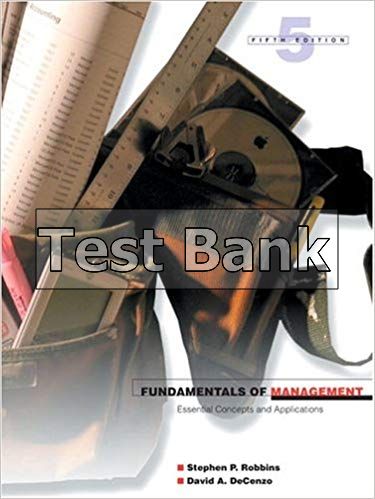Fundamentals of Management Essential Concepts and Applications 5th Edition Robbins Test Bank
$26.50$50.00 (-47%)
Fundamentals of Management Essential Concepts and Applications 5th Edition Robbins Test Bank.
You may also like
Fundamentals of Management Essential Concepts and Applications 5th Edition Robbins Test Bank

Product details:
- ISBN-10 : 0131487361
- ISBN-13 : 978-0131487369
- Author: Robbins/DeCenzo
Editorial Reviews Product Description Principles of Management courses that requires a brief and/or skills focused text. Robbins/DeCenzo is the best-selling brief paperback text that gives students more depth and breadth of practical tools to practice their management skills (Management Workshop) than any other textbook. From the Publisher Brief approach to Principles of Management. Streamlined and specialized to allow full coverage in a single term, Fundamentals of Management provides a sound foundation for understanding key management issues, maintains a functional focus and reaches the latest research studies in the field. –This text refers to an alternate Paperback edition. See all Editorial Reviews
Table contents:
Chapter 1 The Context of Health Care Financial Management 1
Changing Methods of Health Care Financing and Delivery 3
Addressing the High Cost of Care 9
Value‐Based Payment Mechanisms 19
Summary 22
Key Terms 23
Review Questions 23
Notes 24
Chapter 2 Health Care Financial Statements 25
The Balance Sheet 27
The Statement of Operations 49
The Statement of Changes in Net Assets 64
The Statement of Cash Flows 66
Summary 71
Key Terms 73
Key Equations 73
Review Questions and Problems 74
Appendix A: Financial Statements for Sample Not‐for‐Profit and For‐Profit Hospitals, and Notes to Financial Statements 84
Note 99
Chapter 3 Principles and Practices of Health Care Accounting 101
The Books 101
An Example of the Effects of Cash Flows on Profit Reporting under Cash and Accrual Accounting 106
Recording Transactions 108
Developing the Financial Statements 118
Summary 125
Key Terms 126
Review Questions and Problems 126
Chapter 4 Financial Statement Analysis 137
Horizontal Analysis 138
Trend Analysis 144
Vertical (Common‐Size) Analysis 144
Ratio Analysis 146
Liquidity Ratios 152
Revenue, Expense, and Profitability Ratios 161
Activity Ratios 169
Capital Structure Ratios 175
Summary 183
Key Equations 186
Key Terms 187
Review Questions and Problems 187
Chapter 5 Working Capital Management 209
Working Capital Cycle 209
Working Capital Management Strategies 211
Cash Management 215
Sources of Temporary Cash 216
Revenue Cycle Management 221
Collecting Cash Payments 225
Investing Cash on a Short‐Term Basis 228
Forecasting Cash Surpluses and Deficits: The Cash Budget 230
Accounts Receivable Management 233
Methods to Monitor Revenue Cycle Performance 237
Fraud and Abuse 239
Summary 243
Key Terms 246
Key Equations 246
Review Questions and Problems 246
Notes 257
Chapter 6 The Time Value of Money 259
Future Value of a Dollar Invested Today 260
Present Value of an Amount to Be Received in the Future 267
Future and Present Values of Annuities 270
Future and Present Value Calculations and Excel Functions for Special Situations 276
Summary 284
Key Terms 285
Key Equations 286
Review Questions and Problems 287
Appendix B: Future and Present Value Tables 292
Note 301
Chapter 7 The Investment Decision 303
Objectives of Capital Investment Analysis 304
Analytical Methods 307
Using an NPV Analysis for a Replacement Decision 321
Summary 326
Key Terms 328
Key Equation 328
Review Questions and Problems 328
Appendix C: Technical Concerns in Calculating Net Present Value 336
Appendix D: Adjustments for Net Working Capital 342
Appendix E: Tax Implications for For‐Profit Entities in a Capital Budgeting Decision and the Adjustment for Interest Expense 345
Appendix F: Comprehensive Capital Budgeting Replacement Cost Example 349
Chapter 8 Capital Financing for Health Care Providers 361
Equity Financing 364
Debt Financing 365
Bond Issuance Process 377
Lease Financing 389
Summary 396
Key Terms 397
Key Equations 398
Review Questions and Problems 398
Appendix G: Bond Valuation, Loan Amortization, and Debt Borrowing Capacity 402
Notes 411
Chapter 9 Using Cost Information to Make Special Decisions 413
Break‐Even Analysis 414
Product Margin 437
Applying the Product Margin Paradigm to Making Special Decisions 441
Summary 448
Key Terms 449
Key Equations 450
Review Questions and Problems 450
Appendix H: Break‐Even Analysis for Practice Acquisition 461
Chapter 10 Budgeting 467
The Planning‐and‐Control Cycle 467
Organizational Approaches to Budgeting 472
Types of Budgets 483
Monitoring Variances to Budget 490
Group Purchasing Organizations 492
Summary 494
Key Terms 496
Key Equation 497
Review Questions and Problems 497
Appendix I: An Extended Example of How to Develop a Budget 499
Chapter 11 Responsibility Accounting 523
Decentralization 523
Types of Responsibility Centers 526
Measuring the Performance of Responsibility Centers 531
Budget Variances 533
Summary 545
Key Terms 547
Key Equations 548
Review Questions and Problems 548
Chapter 12 Provider Cost‐Finding Methods 553
Cost‐to‐Charge Ratio 553
Step‐Down Method 554
Activity‐Based Costing 561
Summary 573
Key Terms 573
Review Questions and Problems 574
Chapter 13 Provider Payment Systems 579
Evolution of the Payment System 583
Risk Sharing and the Principles of Insurance 607
Evolving Issues 612
Technology 614
Summary 616
Key Terms 616
Review Questions and Problems 617
Appendix J: Cost‐Based Payment Systems 619
Notes 624
Glossary 627
Useful Websites 653
Index 657
People also search:
Fundamentals of Management Essential Concepts and Applications 5th
Fundamentals of Management Essential Concepts and Applications 5th edition
Fundamentals of Management Essential Concepts and Applications 5th pdf
Fundamentals of Management Essential Concepts and Applications 5th pdf free
Fundamentals of Management Essential Concepts and Applications 5th download scribd












